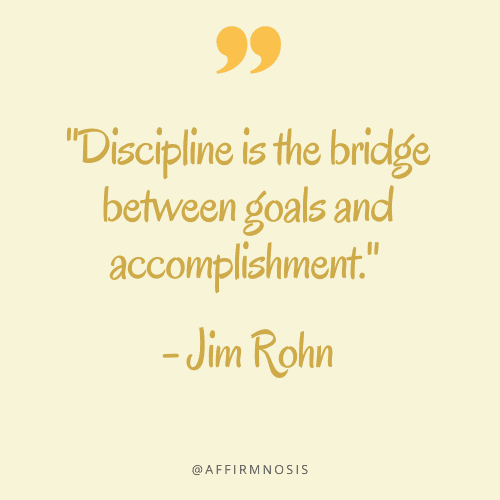Discipline and motivation are two essential components required for achieving success in any area of life. While they are often used interchangeably, they are two distinct concepts that work together to create a productive environment.
Discipline is the ability to control one’s behaviour and follow a set of rules or principles, while motivation is the driving force behind one’s actions towards achieving a goal. The importance of discipline and motivation cannot be overstated when it comes to achieving goals.
Without discipline, it becomes easy to veer off track and lose sight of the end goal. Similarly, without motivation, even the most disciplined person can lose interest and momentum towards reaching their goals.
Understanding how these concepts work together is crucial in finding balance towards achieving success. In this article, we will explore both discipline and motivation in detail, discuss their importance in achieving goals, highlight their relationship with each other, and provide tips on how to find a balance between them.
Definition of Discipline and Motivation
Discipline can be defined as self-control or self-regulation that enables individuals to stay committed to their long-term goals despite various distractions or temptations along the way. It involves setting clear boundaries for oneself and following through with them consistently over time.
On the other hand, motivation refers to an individual’s drive or desire to achieve something specific. It is an inner force that propels individuals forward towards their desired outcome.
Motivation can come from various sources such as personal aspirations, external rewards or recognition from others. Both concepts require conscious effort from individuals but differ in terms of where the focus lies- discipline requires external control while motivation relies on internal drive.
The Importance of Discipline and Motivation in Achieving Goals
Discipline plays a critical role in ensuring that individuals remain focused on their long-term goals despite various distractions or temptations along the way. It provides individuals with the necessary structure and boundaries to stay on track towards their desired outcome. Discipline also helps individuals build endurance, resilience and self-awareness that are crucial in achieving success.
Motivation, on the other hand, provides individuals with a sense of direction and purpose towards their goals. It brings excitement and passion into the process of achieving goals, making it easier for individuals to sustain their efforts over time.
Motivation acts as a driving force that keeps individuals moving forward towards their desired outcome. Both discipline and motivation are essential in achieving success as they work together in a complementary manner to produce desired outcomes- Without discipline, it becomes easy for individuals to lose sight of their long-term goals while without motivation; it becomes difficult to remain excited about the journey.
Overview of the Relationship between Discipline and Motivation
Discipline and motivation share an interdependent relationship where both concepts work together to create a productive environment that enables individuals to achieve their desired outcomes. Discipline provides structure, consistency, focus and self-control needed for sustained effort while motivation brings energy, drive, enthusiasm and passion into the process of goal achievement.
It is important to note that while discipline focuses on controlling behaviour through external means such as routines or schedules; motivation relies on internal factors such as desire or passion. Maintaining an appropriate balance between these two concepts is crucial in finding success in any area of life- too much discipline may result in burnout or loss of interest while too much motivation may lead to unrealistic expectations or inability to maintain momentum over time.
Understanding how discipline vs motivation works together is key towards finding balance when working towards achieving one’s goals. In the following sections we will discuss each concept separately before delving into how they complement each other- highlighting strategies you can use for finding the right balance between these two concepts for greater productivity and success.
Discipline
Discipline is the ability to control oneself and act in accordance with established rules. It refers to the practice of training oneself to do something in a controlled and timely manner, even when it’s difficult or unpleasant. Discipline means committing to a set of behaviors that will lead to success, whether that be in personal or professional life.
The Benefits of Discipline
There are numerous benefits that come from practicing discipline. Self-discipline has been linked to greater success in many areas such as academic performance, career advancement, and overall health and well-being.
When you practice self-discipline, you become more reliable, productive, and consistent. You develop the ability to delay gratification and resist temptation which makes it easier for you to focus on your long-term goals.
How To Develop Discipline
Developing discipline may seem like a daunting task at first but it is possible with consistency and effort. Here are some tips on how you can develop self-discipline:
Setting Clear Goals
Setting clear goals is crucial in developing discipline. Without specific goals in mind, it can be difficult to stay motivated and focused on what needs to be accomplished. Take some time to set measurable goals that align with your personal values.
Creating a Routine
Creating a routine is essential for building discipline because it helps establish consistent habits. A routine helps make tasks feel less daunting while maximizing productivity throughout the day.
Prioritizing Tasks
Prioritizing tasks involves understanding what needs immediate attention versus what can wait until later. This will help avoid being overwhelmed by too many tasks at once while allowing you to stay focused on your most important objectives.
Avoiding Distractions
Distractions are one of the biggest obstacles when practicing self-discipline. It’s crucial to identify what distracts you and eliminate those distractions.
This may mean turning off your phone or avoiding social media during working hours. By practicing these tips, you can begin to develop the self-discipline needed to achieve your goals.
Remember, discipline is a learned behavior that requires consistency and effort. Over time, it will become a habit that helps you lead a more successful, fulfilling life.
Motivation
Motivation is defined as the driving force that compels an individual to act and pursue their goals. It encompasses a person’s desire, enthusiasm, and willingness to push themselves towards success. Motivation can come from external factors such as recognition, reward or encouragement from others, or internal factors such as personal satisfaction and fulfilment.
The Benefits of Motivation
The importance of motivation in achieving success cannot be overstated. It provides individuals with the energy and drive needed to overcome obstacles and challenges while staying focused on their goals. When people are motivated, they are more likely to be productive, proactive and take risks that lead to increased growth and development both personally and professionally.
A motivated person is also more likely to take initiative when faced with a challenge than someone who lacks motivation. Additionally, motivation helps build resilience in individuals.
It gives them the ability to weather setbacks and learn from failures. A motivated person is also more likely to be committed towards achieving their goals for the long term rather than giving up when faced with adversity.
How To Develop Motivation
Developing motivation requires a conscious effort on an individual’s part since it does not always come naturally. Some techniques that can help develop motivation include:
- Setting achievable goals: having clear goals creates a sense of direction for individuals hence they have something specific they are working towards.
- Creating a vision board or visual reminders: visual aids such as posters or photos of what one wants to achieve can serve as daily reminders for people on why they started their journey in the first place.
- Finding inspiration in others or oneself: Learning from others who have accomplished similar goals can help inspire individuals to push themselves harder. Building self-awareness and reflecting on past accomplishments can also help individuals find inspiration within themselves.
Incorporating these techniques into daily routines will help individuals develop the motivation needed to achieve their goals.

Discipline vs Motivation: Which is more important?
When it comes to achieving success, there is a common debate between which is more important: discipline or motivation. Some argue that discipline is the key to success because it provides the structure and consistency needed to follow through with tasks and achieve goals.
Others argue that motivation is crucial because it fuels the fire within us to take action towards our goals. However, both concepts are equally important for achieving success.
The importance of both in achieving success
Discipline and motivation are both essential ingredients for success. Discipline provides the framework for making progress towards a goal, while motivation fuels our desire to achieve it.
Without discipline, we may lack focus and direction, while without motivation, we may feel uninspired or unsure of our ability to succeed. For example, imagine a person who has all the necessary skills and knowledge but lacks discipline.
They may struggle to make progress towards their goal because they lack structure and consistency in their approach. On the other hand, imagine someone who has all the necessary drive and passion but lacks focus or direction due to a lack of discipline; they may find themselves jumping from one task to another without ever finishing anything.
Their interdependence on each other
While both concepts are important on their own, they also rely on each other for optimal results. Discipline provides the framework for taking action towards our goals while motivation fuels our desire to do so. Without motivation, even the most disciplined person can become unmotivated or burnt out over time.
On the other hand, without discipline, even highly motivated individuals can struggle with follow-through or staying on track when things get tough. Therefore, by having both discipline and motivation working together in harmony can help us achieve long-term success.
How they work together to achieve results
Discipline helps us establish habits that lead to success, such as setting daily routines and prioritizing tasks. It provides the structure needed to create sustainability and consistency over time. Motivation, on the other hand, helps us stay energized and excited about our goals by providing us with a sense of purpose and drive.
By combining discipline with motivation, we can cultivate an unstoppable force within ourselves that drives us towards our passions and personal goals. Motivation gives us the inspiration we need to take action, while discipline provides the structure necessary to maintain momentum even when facing obstacles or setbacks.
Discipline and motivation are both important concepts for achieving success. While some may argue that one is more important than the other, both are equally critical for long-term progress.
By cultivating both discipline and motivation in our lives, we can create a harmonious relationship between structure and passion that allows us to achieve our dreams. Let’s keep in mind that balance is crucial; too much of anything can be destructive or ineffective.
Tips for Balancing Discipline and Motivation
Creating a Schedule that Balances Both
One of the most critical elements of balancing discipline and motivation is maintaining a schedule that incorporates both. A schedule should outline specific times for focused, disciplined work, as well as time for relaxation and inspiration to maintain motivation.
One effective way to create this balance is by breaking down tasks into smaller, more manageable steps. This allows you to set realistic deadlines for each step while still maintaining focus on long-term goals.
Another useful technique is to block out specific times for different tasks. For example, if you work best in the morning, schedule your most challenging tasks during that time.
Similarly, if you find yourself losing focus after lunch, then reserve easier or more enjoyable activities for later in the day. By creating a balanced schedule tailored to your unique needs and preferences, you can achieve optimal levels of productivity while also maintaining motivation.
Maintaining Accountability through Tracking Progress
Another crucial step in balancing discipline and motivation is accountability. Without clear measures of success or progress toward goals, it can be tough to stay motivated or even know how much progress has been made. One effective way to maintain accountability is through tracking progress regularly.
Tracking progress can be done in several ways depending on the goal at hand. For example, setting up a daily or weekly log can help track small wins along the way while also showing how far one has come overall.
Alternatively, using visual aids such as charts or graphs can provide an easy-to-understand snapshot of progress over time. Ultimately regardless of tracking method employed choose one that works best for your personality type and style so that you are more likely to stick with it over the long haul.
Celebrating Small Wins Along The Way
Celebrating small wins along the way is another essential factor in balancing discipline and motivation. It is important to remember that progress is not always linear, and setbacks or obstacles are often a part of the journey.
By taking time to acknowledge and celebrate small wins, you can maintain motivation even during difficult times. Celebrate milestones with healthy rewards like taking a day off work or spending time with loved ones.
It’s also helpful to reflect on how far you’ve come, no matter how small the progress may seem at the time. Doing so will help you stay optimistic and focused on achieving your larger goals.
Balancing discipline and motivation is key to achieving success in any area of life. A schedule that incorporates both can provide structure while also allowing for inspiration.
Accountability through tracking progress can help one stay on track towards desired outcomes while celebrating small wins along the way makes it more fun and enjoyable! By employing these tips, anyone can balance discipline and motivation effectively, making it easier than ever before to achieve their goals – whatever they may be!
The Importance of Finding Balance Between the Two Concepts
While discipline and motivation are both important concepts in achieving success, it is equally important to find balance between the two. Too much discipline can lead to burnout and lack of creativity while too much motivation can lead to procrastination or a lack of focus.
Finding a healthy balance between the two is key. By balancing your approach with discipline and motivation you can create an environment that encourages positive habits while also keeping things fresh with new ideas that push you forward.
Encouragement To Apply These Concepts In Daily Life For Success
Discipline and motivation are powerful tools for achieving your goals. However, it takes time and effort to develop these habits into your daily life so they become natural.
Remember that change does not happen overnight, but rather over time with consistent effort. Start small by incorporating simple routines into your day such as waking up at the same time each day or setting small goals for yourself daily.
As you become more comfortable with these habits gradually increase your goals over time until you reach bigger achievements. Whether it’s improving productivity at work or achieving personal milestones remember that with dedication anything is possible when one finds balance between the disciplines and motivations in their life.
20 quotes from notable individuals on the topic of self-discipline:
- “Discipline is the bridge between goals and accomplishment.” – Jim Rohn
- “Self-discipline begins with the mastery of your thoughts. If you don’t control what you think, you can’t control what you do.” – Napoleon Hill
- “The first and greatest victory is to conquer yourself.” – Plato
- “With self-discipline most anything is possible.” – Theodore Roosevelt
- “Discipline is the soul of an army. It makes small numbers formidable; procures success to the weak, and esteem to all.” – George Washington
- “It was character that got us out of bed, commitment that moved us into action, and discipline that enabled us to follow through.” – Zig Ziglar
- “Discipline is choosing between what you want now and what you want most.” – Abraham Lincoln
- “The only discipline that lasts is self-discipline.” – Bum Phillips
- “Self-discipline is when your conscience tells you to do something and you don’t talk back.” – W. K. Hope
- “Self-discipline is the magic power that makes you virtually unstoppable.” – Dan Kennedy
- “Self-discipline is that which, next to virtue, truly and essentially raises one man above another.” – Joseph Addison
- “Self-command is the main discipline.” – Ralph Waldo Emerson
- “The ability to discipline yourself to delay gratification in the short term in order to enjoy greater rewards in the long term, is the indispensable prerequisite for success.” – Brian Tracy
- “Discipline is remembering what you want.” – David Campbell
- “Self-discipline is a form of freedom. Freedom from laziness and lethargy, freedom from the expectations and demands of others, freedom from weakness and fear—and doubt.” – H.A. Dorfman
- “Discipline is the refining fire by which talent becomes ability.” – Roy L. Smith
- “Without self-discipline, success is impossible, period.” – Lou Holtz
- “Discipline is just choosing between what you want now and what you want most.” – Augusta F. Kantra
- “We must all suffer one of two things: the pain of discipline or the pain of regret or disappointment.” – Jim Rohn
- “The good Lord gave you a body that can stand most anything. It’s your mind you have to convince.” – Vince Lombardi
These quotes emphasize the importance of self-discipline in achieving goals, overcoming challenges, and creating success.
Here are 20 motivational quotes




























































